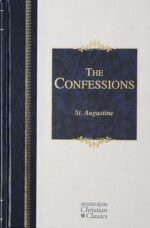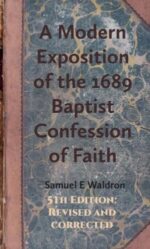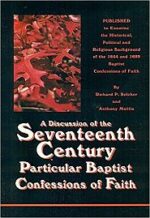-
The Confessions (St. Augustine)
$15.25Written in the waning days of the Roman era, Augustines Confessions are the moving diary of a soul’s journey. From his earliest memories of childhood, through his turbulent and licentious youth, to his resolute conversion at the age of 32, Augustine traces a pilgrimage of unbounded grace. Throughout, he passionately addresses the spiritual questions that have engaged thoughtful minds since time began.$16.95 -
A Modern Exposition of the 1689 Baptist Confession of Faith – 5th edition (Samuel Waldron)
$29.99The best edition ever of Samuel Waldron’s work on the 1689.
Modern Christianity is awash in a flood of doctrinal relativity. Satan and his forces love the imprecision and ambiguity which are rampant in our day. As C. H. Spurgeon observed, “The arch- enemy of truth has invited us to level our walls and take away our fenced cities.”
This exposition was originally published in 1989 to mark the 300th anniversary of the publication of the Second London Confession, which also became known as the 1689 Baptist Confession of Faith. Today, Reformed Baptists worldwide hold this Confession in high esteem and many churches continue to regard it as their official statement of faith. In this extensive exposition, the author Sam Waldron shows that the 1689 Confession is a masterly statement of the historic Christian faith. He writes in a direct and lucid style that will help ministers, students and laymen alike to a clear understanding of this Confession and to its relevance and application to our modern age.
$42.99 -
The Apostles’ Creed (Albert Mohler)
$14.99The former president of Southern Baptist Theological Seminary reveals how understanding and living out of the oldest summary of Christian belief leads to a confident, bold, joy-filled existence in a world of confusion and uncertainty.
The Apostles’ Creed has shaped and guided the Christian faith for almost two thousand years. Few documents in the history of the church have similar influence on the life of ordinary believers. Shared by Protestant, Roman Catholic, and Eastern Orthodox traditions, the Apostles’ Creed is perhaps the most compelling and formidable statement of Christian doctrine the world has ever known. But do we know what it really means—and how it applies to us today?
$19.99 -
To Win Our Neighbors for Christ (Wes Bredenhof)
$8.50The Missiology of the Three Forms of Unity: Explorations in Reformed Confessional Theology
In many modern histories of Christian missions, the Protestant Reformation of the 16th century is depicted as a movement lacking missionary zeal. it has virtually become a given that the Reformation was not oriented to the church’s missionary task. In To Win our Neighbors for Christ, Wes Bredenhof answers these charges, proving that it is a mistake to say the Reformation and the confessional documents it produced have nothing to say about missions.
The author demonstrates that the three forms of Unity—the Belgic Confession, the Heidelberg Catechism, and the Canons of Dort — properly understood, have much to off er the study of missions. more importantly, they encourage us to care about a world lost in unbelief, making us more mission oriented and outward looking.
$10.00
FREE DELIVERY
When ordering from $500.







